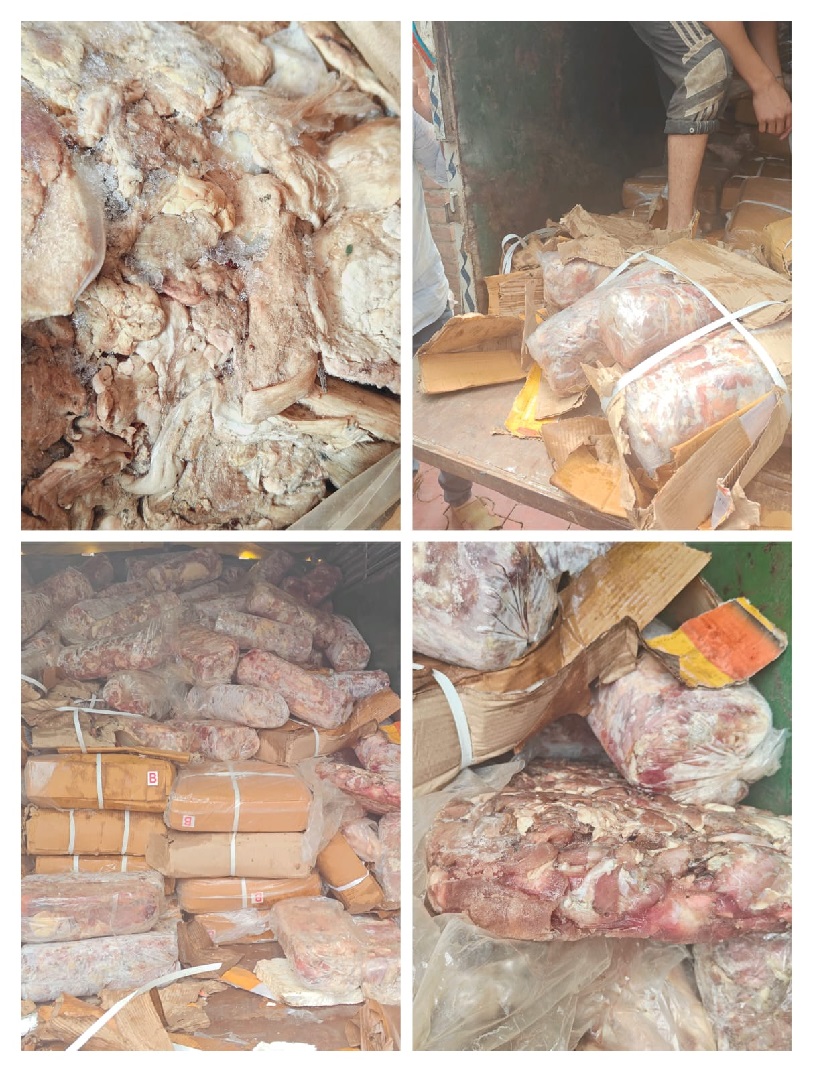A Rotten Truth: Is Unsafe Food Gutting Kashmir’s Health?
By: Javid Amin | 01 Aug 2025
1,200 kg of Decomposed Meat Seized in Srinagar: Just the Tip of the Iceberg
Kashmir’s food system is in crisis.
A recent raid on a cold storage unit in Zakura, Srinagar, uncovered 1,200 kilograms of decomposed meat stored in unhygienic, non-refrigerated conditions—pre-packed and ready to be distributed to unsuspecting restaurants and vendors across the Valley.
This isn’t an isolated case.
Authorities have also seized 51,000+ kilograms of adulterated food items in recent crackdowns across Jammu and Kashmir—including fake cheese, expired soft drinks, and counterfeit Rasgullas—laying bare the scale of food fraud choking Kashmir’s kitchens.
Public Health in Peril
Doctors and public health officials are raising alarms about a surge in foodborne illnesses linked directly to contaminated and adulterated food.
Key health issues reported:
-
Hepatitis A & E outbreaks, triggered by contaminated water and food.
-
Coliform bacterial infections, indicating fecal contamination in street food.
-
Drug-resistant gut bacteria, believed to be linked to antibiotic-laced or unhygienic meat.
-
Chronic liver and gastrointestinal diseases, especially among youth who frequently eat outside.
“We’re seeing more young patients with liver damage and gastrointestinal issues—many tied to unhygienic food,” says a senior doctor at SKIMS.
Unsafe Food is Everywhere: From Butchers to Bakeries
Widespread violations include:
-
Improper meat storage: Many meat shops in Srinagar and beyond operate without cold chain support, storing poultry and mutton in fly-infested, room-temperature environments.
-
Fake dairy products: Seized items include starch-laced paneer, chemically whitened milk, and counterfeit ghee—many entering the market with fake labels or no licensing at all.
-
Street food contamination: Vendors reuse cooking oil multiple times, increasing carcinogenic compounds; handwashing facilities are nonexistent, and waste disposal is poor.
-
Expired or relabelled goods: Bakeries and supermarkets are accused of rebranding expired stock, including snacks and confectionery.
What’s Causing the Crisis?
01. Breakdown in Regulatory Oversight
-
Food safety inspections are sporadic and often reactive, triggered only after public complaints or festival seasons.
-
Most units operate without a food license, and those caught are rarely penalized beyond a nominal fine.
02. Overreliance on Imported Meat
-
Frozen meat from Punjab, Haryana, and Delhi enters Kashmir without inspection.
-
Local markets lack facilities to check antibiotic residue or cold-chain integrity.
03. Low Public Awareness
-
Many consumers are unaware of food labeling, safety standards, or how to report violations.
-
Eatery patrons often prioritize taste and cost over hygiene—empowering unscrupulous vendors.
04. Corruption and Red Tape
-
Traders allege that officials routinely ignore violations in exchange for bribes.
-
Licensing procedures are complex, deterring small businesses from complying legally.
Data Points That Matter
| Category | Value (2025 YTD) |
|---|---|
| Adulterated food seized | 51,000 kg+ |
| Meat unfit for consumption | 1,200 kg (1 raid) |
| Active food safety inspectors | < 30 in entire UT |
| Meat consumption in Kashmir | 1.5 crore sheep/year |
| Unlicensed eateries | ~40% (est.) |
Not Just Rotten Meat—Rotten Governance
This is not just a food issue. It is a failure of systems, ethics, and governance.
-
The Food Safety Department lacks manpower, mobility, and lab testing facilities.
-
Local authorities often conduct symbolic raids without sustained follow-up or prosecution.
-
Court cases against violators drag on, with minimal convictions.
“Without proper deterrents, unscrupulous traders treat fines as just a cost of doing business,” noted a former health commissioner.
What Needs to Change — Now
Short-Term Fixes:
-
Regular, unannounced inspections across districts.
-
Hotline for consumer complaints, followed by real-time response teams.
-
Seizure and public naming of outlets found selling unsafe food.
Medium-Term Measures:
-
Mandatory food safety certification for all vendors, especially meat and dairy sellers.
-
Training workshops for street vendors on hygiene and food handling.
-
Mobile food testing vans to expand rural and small-town oversight.
Long-Term Reforms:
-
Strengthen the Food Safety Authority of J&K with better staffing and budgets.
-
Make cold-chain verification mandatory for meat and dairy wholesalers.
-
Integrate food safety into Smart City initiatives, especially in Srinagar and Jammu.
-
Create consumer awareness campaigns through schools, media, and mosques.
Final Word: It’s Not Just About What We Eat—It’s About Who We Trust
Every meal in Kashmir today comes with a question mark. Is the milk genuine? Is the meat fresh—or from an uninspected stockpile? Has that Rasgulla passed any safety test?
Food is a fundamental right—and trust in that food is a social contract between citizens, businesses, and the government. Right now, that contract is broken.
Until accountability becomes routine, and health trumps profit, Kashmir’s food will continue to carry a bitter aftertaste.



